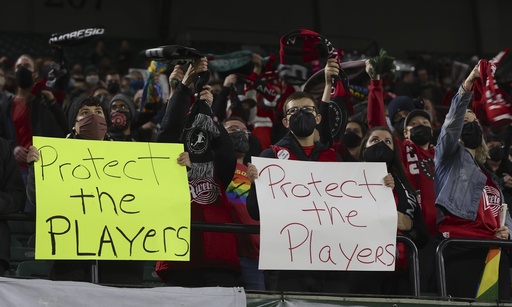The National Women’s Soccer League (NWSL) has announced the creation of a $5 million fund aimed at supporting players who experienced emotional and sexual misconduct within the league. This initiative comes as part of a settlement related to serious allegations that surfaced in 2021, which had a significant impact on the league’s environment.
Attorneys general from Washington, D.C., Illinois, and New York revealed this settlement agreement with the league on Wednesday. The allocated funds will primarily benefit players who have suffered abuse. The settlement also mandates the league to uphold the protective measures that were established following extensive investigations conducted in late 2022. These investigations uncovered pervasive misconduct involving various teams, coaches, and players.
Additionally, the agreement empowers the attorneys general—Brian L. Schwalb from Washington, D.C., Letitia James from New York, and Kwame Raoul from Illinois—to oversee the changes implemented by the NWSL after the scandal emerged, along with the authority to impose penalties should the league fail to adhere to these reforms.
Schwalb emphasized the grave nature of the findings during a conference call with journalists, stating, “Two separate investigations confirmed what the players had been experiencing and reporting for years. Systemic leaguewide failures permitted a culture of inappropriate and abusive behavior, which included verbal abuse and harassment, without any clear mechanisms to ensure player safety.” He acknowledged the significant improvements made by the league since the reports were published but underscored the fact that victims had not received compensation for their suffering until now.
The issue gained traction when former players Sinead Farrelly and Mana Shim brought their allegations against well-known NWSL coach Paul Riley to light in 2021, claiming instances of sexual harassment and manipulation that spanned over a decade. Riley, who has maintained his innocence, was dismissed by the North Carolina Courage amid these claims, which contributed to a larger reckoning within the league that saw multiple head coaches either fired or resigning due to misconduct. The then-commissioner of the NWSL also stepped down in the wake of the controversy.
In response to the allegations, the NWSL, its players’ association, and U.S. Soccer conducted thorough investigations. Notably, the report from U.S. Soccer, spearheaded by former acting U.S. Attorney General Sally Q. Yates, highlighted that emotional abuse and sexual misconduct were widespread issues within the sport.
In light of these findings, the NWSL has implemented various changes to enhance player protection, while the Players Association has also secured additional safeguards in the league’s collective bargaining agreement. Erin Simon, a retired player and a survivor of abuse in the league, expressed gratitude for the settlement’s provisions, particularly those related to mental health support. “This is a significant step forward, though it doesn’t erase the pain caused to those affected,” she noted.
Tori Huster, the president of the NWSL Players Association and a former player, highlighted the importance of the players’ collective voice in achieving this outcome. “This $5 million fund is not a gift or a form of justice but rather a recognition of the failures that took place and the harm that players endured,” she stated.
Some of the ongoing safeguards stipulated in the settlement include enhanced vetting processes for team staff, accessible reporting systems for abuse, free and unlimited counseling for players, availability of a league safety officer, and policies that prevent teams from self-investigation.
Current NWSL Commissioner Jessica Berman expressed commitment to working with the players’ association and the attorneys general to ensure the successful implementation of these changes. She pointed out the importance of maintaining the trust of players and striving to create an environment that attracts top talent.
The settlement also designates retired Judge Barbara S. Jones to manage the restitution fund. Jones, who previously participated as an independent member in overseeing the league’s investigation with the players’ union, has 45 days to craft a plan for fund distribution, which must then be approved by the attorneys general. Eligible players will be notified on approval and provided six months to apply for compensation.
The NWSL was founded in 2013 and currently has 14 teams, with plans to expand by adding two more teams in 2026. Letitia James highlighted the significance of this agreement, stating, “It marks a new chapter in women’s soccer, where athletes can thrive without fear of misconduct. Together, we can create a future in which every athlete feels safe, respected, and empowered to excel.”
In conclusion, the establishment of the fund and the accompanying reforms symbolize a critical step towards accountability and a safer environment for current and future players in the league.



